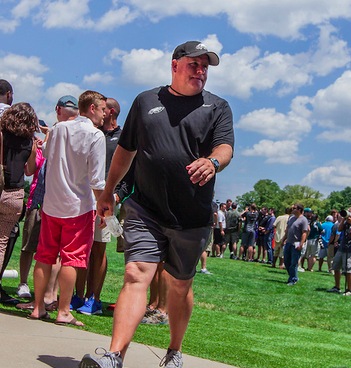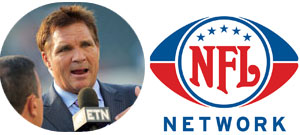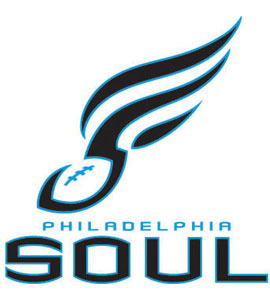EAGLES HEAD COACH CHIP KELLY PRESS CONFERENCE 8.8.15
admin

Q. RB DeMarco Murray returned to practice yesterday, but it didn’t seem like he did everything. What is holding him back?
COACH KELLY: He was sick. He’s going full today. He was just sick. There’s a couple guys that were sick that had been in and out. [WR] Jordan Matthews was sick and missed walkthrough yesterday. There is something going around. But we were just getting [Murray] back up to speed, but he’s full-go today.
Q. Is that the same reason for TE Zach Ertz and LB Mychal Kendricks missing yesterday’s practice?
COACH KELLY: No. They just had a nagging something. They are both back today.
Q. How about LB Kiko Alonso?
COACH KELLY: Kiko has to go through the injury protocol – the concussion protocol, not the injury protocol. He has not been cleared yet, so until he’s cleared, he’ll just be doing exercises with the trainers.
Q. Is there a timetable for his return?
COACH KELLY: I don’t even ask, they just tell me when he’s cleared.
Q. Did he have any concussion history at Oregon?
COACH KELLY: No, he didn’t. I think they said it was his first, but I’m not sure. You’ll have to check on that, but he didn’t have any in Buffalo.
Q. S Jerome Couplin has missed the last few days of practice ‑‑
COACH KELLY: He had appendicitis.
Q. How long will he be out?
COACH KELLY: I think he’ll be back at the beginning of next week.
Q. So he had an appendectomy?
COACH KELLY: Yes. He was sick the other day and his stomach was bothering him and then they said it was appendicitis.
Q. Do you worry about Alonso given his style of play? He’s an aggressive type of linebacker. Do you worry about the head injury?
COACH KELLY: No, because he doesn’t have a history of it. So we are not worried about it right now. But obviously any time that word comes up with any player, you’ll take all of the precautions necessary before you put him back out there.
Q. When did he sustain the concussion?
COACH KELLY: I don’t know. It was at the Linc [Lincoln Financial Field]. I don’t know what specific play, but it was Tuesday at the Linc.
Q. Is Alonso in the building or is he at home?
COACH KELLY: He’s here. He’s been working with the trainers every day. They have a whole protocol that they go through on what they are allowed to do. There are exercises and then there are tests and all those other things.
Q. T Lane Johnson had a disjointed season last year. What have you seen from him this spring and this summer with full first‑team reps?
COACH KELLY: I just think he is more consistent. He worked extremely hard this offseason and went to a lot of different places to train. He really settled into where – obviously, at this time last year, he knew he wasn’t going to play in the first four games and he was kind of up‑and‑down. Allen [G/T Allen Barbre] got a lot of reps out there because that was where we were going from that standpoint.
So I just think there’s a little bit more solidified on that side of line and he’s just getting more comfortable with who the tight ends are going to be next to him and what he’s going to be doing over there. I just think there’s a lot more consistency going into Year Three.
Q. Johnson relied on Todd Herremans a lot because of Herremans’ experience. Has Herremans’ departure allowed Johnson to take a step forward?
COACH KELLY: Well, he didn’t play the last eight games [of last season] with Todd, so I think in his first year, I would say that he relied on Todd a lot, but he didn’t really play with Todd very much in the second season because Todd got that injury.
Q. How has G.J. Kinne been in the transition away from quarterback? How comfortable does he look out there?
COACH KELLY: I think he looks real comfortable. The one thing about him, is he can play a lot of different positions. That versatility is a benefit to him. He’s a lot like Brock Holt for the [Boston] Red Sox; you can plug him into a lot of different places. He can fit in at running back for us, he can still be an emergency quarterback for us and he’s done a really nice job at receiver for us. He’s trying to realy make a niche for himself on special teams. You know, it’ll be interesting to see when we get out against the Colts, how he fits in.
Q. Beyond the first three running backs – DeMarco Murray, Ryan Mathews and Darren Sproles — how have RBs Raheem Mostert and Kenjon Barner looked?
COACH KELLY: They are both doing really well. I think that’s an interesting ‑‑ with those two guys, I think probably the big decisions will come down from a special teams standpoint, in terms of being able to contribute.
When you get past your starters at any position, especially the skill positions, it really becomes special teams’ decisions in terms of how they fit in and what they do. Obviously Kenjon has a leg up from an experience standpoint and having been here before, but Raheem has some really good qualities himself. He’s extremely fast. I think he was the Big Ten 100‑, 200‑meter champion. You can kind of see him when he sticks his foot into the ground, he gets it into another gear. I think both those guys have been ‑‑ I think we have upgraded really in the bottom part of our roster in the running back spot. It will be interesting to see how that thing plays itself out.
Q. How would you characterize QB Sam Bradford in practice yesterday?
COACH KELLY: I thought Sam had a good practice. He’s getting more comfortable. The more 11‑on‑11 he gets and pocket awareness and things like that. I think that’s what we expected when we traded for him. That’s the type of player we saw on film. That’s the type of guy that Pat [offensive coordinator Pat Shurmur] coached when he had him at St. Louis. I thought he had a real good day yesterday and then we have to continue to build on that.
Q. Going back to Kinne, both those positions, running back and wide receiver, there’s a fair amount of nuance and detail to actually doing that. Is he picking that up? Is he someone you can really use in those spots?
COACH KELLY: He’s picked up receiver because that’s where he’s training mostly. The running back part of it, I think a lot of that comes from his quarterback experience, in terms of what he does. But one of the things about G.J. that stands out is that when he was a quarterback, he was a really good runner of the football.
So when you put him in there, I think he understands how to make people miss. He understands how to set up blocks because that’s part of what he did – really, when you go back to what he did in college, he carried the ball a ton in college. I think the running backs part of it is just that he was a running quarterback, so that part is probably a little bit easier transition. The nuances are at the receiver spot and that’s where he does all his training.
Q. Did you see that Nick Foles got paid by the St. Louis Rams?
COACH KELLY: I know that Nick got a new contract, but I don’t know what it was. But I heard he got a new contract.
Q. Your thoughts on that?
COACH KELLY: I’m very happy for him. I think things worked out for him. Nick is an awesome person, first and foremost, and when you get to this league, you always hope you get an opportunity to get to a second contract and it looks like he did.
Q. Until recently, it was very difficult for receivers to come into the NFL and contribute in Year One – at least that’s how the numbers bore out. Last year there was just a remarkable class of rookie receivers in the league and it looks like this class could be the same. What is different now about that position that enables them to come in and contribute right away?
COACH KELLY: I just think they are throwing the ball more at the college level and even more at the high school level. So, a lot of these guys have a ton of experience. Sometimes you don’t find out who guys are as receivers until maybe their junior or senior year [of college] because they get recruited and were playing in different positions in high school.
In high school, they were running backs or defensive backs or even quarterbacks that got converted at the college level to receiver, so they don’t really have, to go back, the nuances of playing the position. But a lot of these guys, when you talk to them, they have been playing receiver since they were 12 years old. I think it’s a little bit different.
You can go back 15 years ago and the best athletes at the younger level were all playing running back. Even a lot of those really good receivers in college were running backs in high school. Now, Nelson [WR Nelson Agholor] was a receiver and you look that Jordan [WR Jordan Matthews] was a receiver. A lot of those guys coming in now have been playing receiver for a long time. So I just think they get a little bit more experience in terms of playing the position.
Q. What have you seen from G Malcolm Bunche that has impressed you?
COACH KELLY: Real good, young prospect in the O‑line. He’s big. He’s physical. Trying to really solidify — I think with those younger guys, and I think what Stout [offensive line coach Jeff Stoutland] is doing is moving [Bunche] around a little bit. He is playing both tackle and guard, which adds to his versatility. But he can move people. He’s a big, physical, strong run-blocking guy. But he does have a good base and knowledge in the pass game. So he’s a guy to keep an eye on.
Q. Where do you see G/T Dennis Kelly right now? Is he more of a tackle than guard now?
COACH KELLY: They are all — everybody, if you look every day, they have all played different positions: whether it’s Graf [T Kevin Graf], whether it’s Kelly or whether it’s [C/G Julian] Vandervelde. [C David] Molk has played a lot of guard, [C Mike] Coccia has played a lot of guard. Stout is just continuing to rotate that second and third group and they are all getting reps at both guard and tackle, or the guys that are center-guards are playing center-guard; so [G] Josh Andrews, Coccia, Molk and Vandervelde are bumping day‑to‑day from center to guard. Dennis Kelly, Graf, [T/G Andrew] Gardner, all those guys are playing guard and tackle.
Q. There are very few guys on the roster that only do one thing. Obviously versatility is good but does it go deeper than that with you?
COACH KELLY: I just think that you have to, when you’re not the number one, when we play on gameday with a 46‑man roster we have seven offensive linemen up. So those two backup offensive linemen have to be able to be ‑‑ one of them is a center-guard guy and one is a guard-tackle guy. And you don’t know what is going to happen in a game.
So when someone goes out ‑‑ we win our first game against Jacksonville, we lost Evan Mathis. We lost a guard and we lost a tackle. So Molk had to play guard and I think Gardner came in and played tackle when Allen [Barbre] went down. That’s just the nature of it. It’s the same thing at any position. If you’re a linebacker we may only keep three outside or we may only keep three inside; if you do that, then that person has to be able to play both inside and outside when they go.
Same thing in the secondary. Are you a safety, are you corner, are you an inside receiver, are you an outside receiver? Unless you’re the number one guy, then those guys have to be able to play multiple positions. Just because when you get out there on Sunday and you have a 46‑man roster you don’t have two deep at every single position.
So you have to kind of make do and just be prepared that if they go, then you’ve got to play guard and tackle and you have to play center and guard or whatever the position.
Q. At Wisconsin, G John Moffitt played center ‑‑
COACH KELLY: He hasn’t done any here because we just got him and he wasn’t here in the spring. We know that’s kind of in his back pocket but we haven’t done anything with John. John is probably the only guy except for the starting five or the starting four right now that has not played multiple positions. All those other guys have: John, [C Jason] Kelce, [T] Jason Peters and Lane [Johnson] have played just one position.
Q. When you first started calling plays in 1999, was that something that came naturally or did you have to learn? Was there a trial and error process?
COACH KELLY: With anything, there’s always a trial and error. There’s always got to be a first time that you do it, whether you’re riding a bicycle, or calling plays, or writing an article, whatever. There’s a process in it and I think there’s an experience that’s gained through in how you did it.”
Q. Was there someone that you learned from?
COACH KELLY: No, I always talk to a lot of different guys. Whether it was Dana Bible when he was at Boston College, or Sean McDonnell who was the former [New Hampshire] offensive coordinator who became the play caller, [former Oregon and LSU offensive coordinator] Gary Crowton. There were a lot of different guys that I had an opportunity to visit with and talk with about it.
Q. You said starting four. When would you like to see one of the guards emerge at right guard?
COACH KELLY: When? Today.
Q. How is that going?
COACH KELLY: It’s an ongoing battle. If it was today, then we would have had one guy just jump out in the first four days of practice and you could set it. But you always would love to have it done sooner than later but we also want to make sure it’s the right guy and the right fit. So we are giving everybody ample opportunities and again with that, a lot of it, there’s a huge difference between our training sessions and a game.
So you can get all jacked up about somebody and say, oh, my God, here we go and then you go out against the Colts and he’s not as good as you thought he was and someone else really steps up. That evaluation won’t be made until we get a couple games underneath our belt.
Q. How do you rate that against wanting to build continuity on the line?
COACH KELLY: Doesn’t matter what continuity if you have the wrong guy. That’s the bottom line. Everybody feels the same way. You love to have everything locked in right now. But if we did, and we’re doing it, we’re locking in the wrong guy, that doesn’t help us as a football team. The great part of our preseason is it is so long that it will give itself a chance to express itself over that time. You’re not making a hasty decision. We’re not playing – that game against the Colts isn’t counting in the standings.
So it’s not like, hey, we’ve got a game, we are starting to get into game week next week ‑‑ preseason game. It’s not a regular‑season game. If it was Atlanta it would be a little bit more difficult. If it was Atlanta we would have to have it done by this weekend so we could at least get guys ready to go.
Q. What is the tape showing you on how DB Walter Thurmond is doing?
COACH KELLY: Walt has done a really nice job. That transition probably goes back to the fact that he’s played inside in nickel and he’s had a lot of experience inside nickel, so our nickel position is similar to a safety position.
He’s seen the game from the inside and I think that’s the biggest transition for a corner because a lot of times, when all you’ve done is play corner, there’s always been one guy here and 10 guys in there. When you see a different perspective of seeing things, you bump that guy inside and it’s a whole different thing, you’re seeing guys out here, you’re seeing guys in here, how do you fit, how do you get involved in things and I think that transition has helped him because of his ability inside.
But I think he’s done a really good job. When we made the move in the spring he really stood out for us in his play in the spring and he’s continuing to do the same things here.
Q. What makes WR Seyi Ajirotutu so good on special teams?
COACH KELLY: First off, his length I think is one of the things that’s unique about him. He’s got great flexibility with that length to make people avoid and miss blocks, but he can get extended and make plays. When you look at his highlight tape of what he did on special teams, he’s always kind of getting around the block and can reach and grab people because he’s so long. He can find the football.
He’s not easily blocked so he is a great cover guy, whether it be on punt coverage or kickoff cover. So there’s a lot of different things there. He understands his niche of getting into the National Football League was really embracing that role on special teams and he was a standout player for San Diego. So now it’s a combination of just like I said earlier, if you are not the number one receiver, which he’s not, then where do you fit in and what’s your versatility and I think he’s shown that so far.
Q. Is there anybody who is not expected to practice today?
COACH KELLY: Couplin and Kiko.












